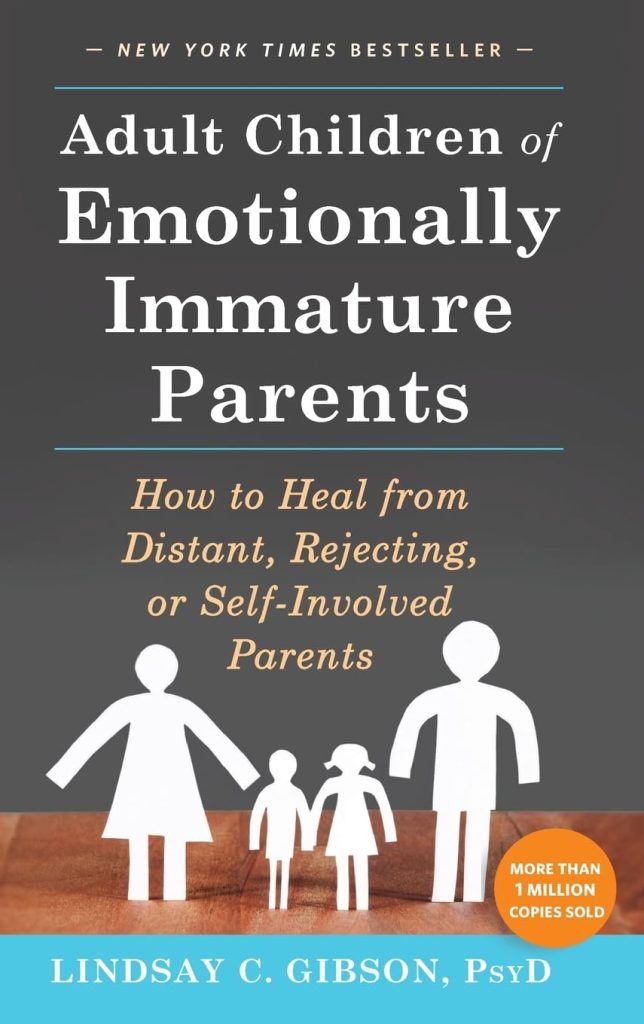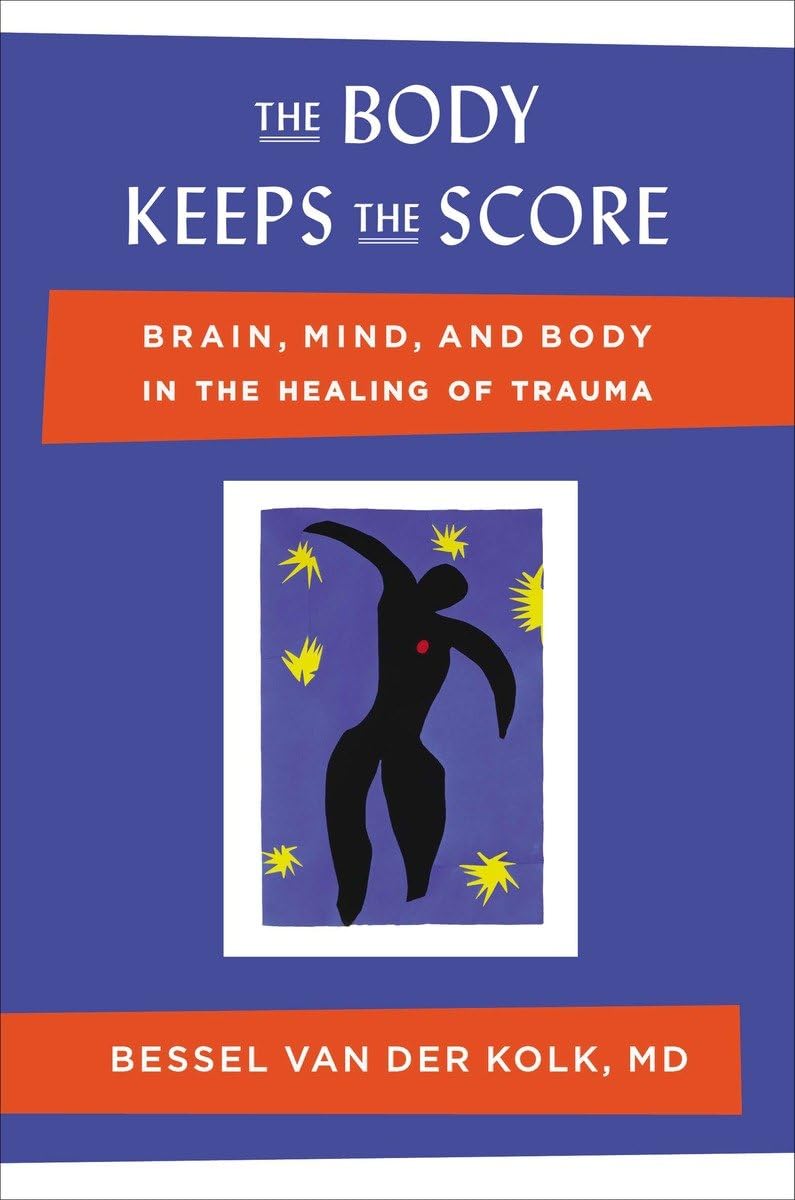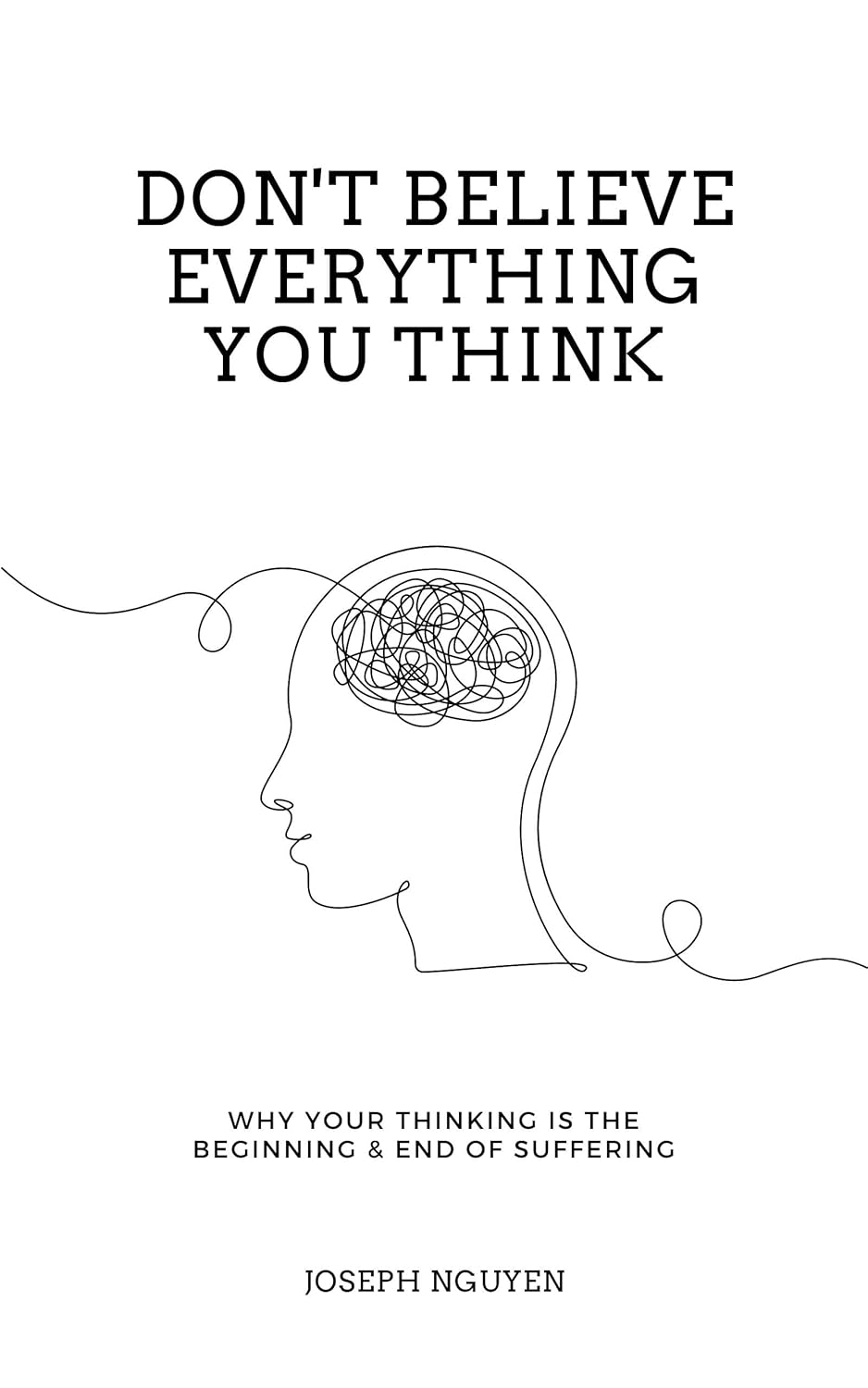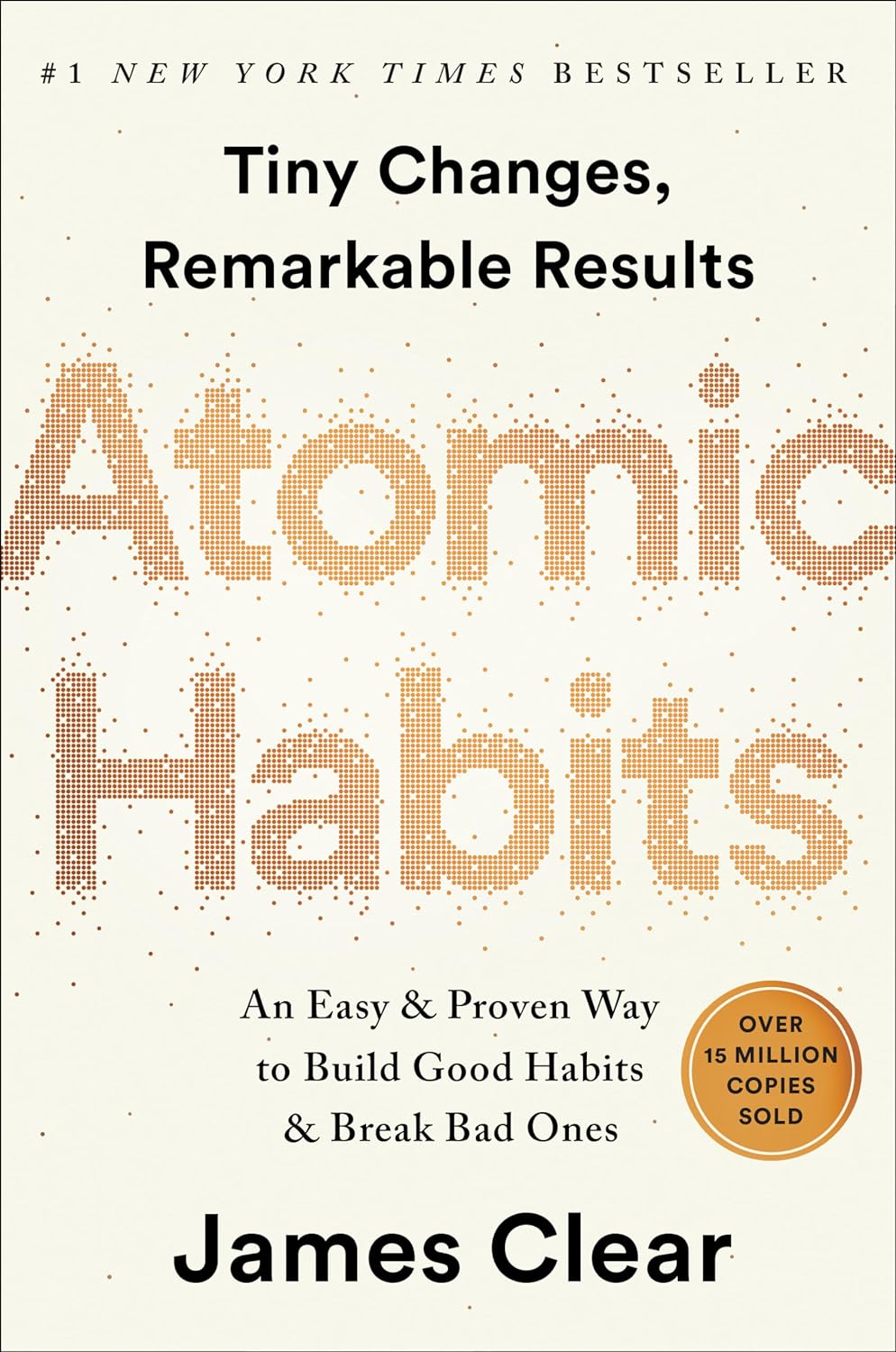
Buy The Book
Chapter
- ✦ Introduction
- ✦ Chapter 1: How Emotionally Immature Parents Affect Their Adult Children’s Lives
- ✦ Chapter 2: Recognizing the Emotionally Immature Parent
- ✦ Chapter 3: How It Feels to Have a Relationship with an Emotionally Immature Parent
- ✦ Chapter 4: Four Types of Emotionally Immature Parents
- ✦ Chapter 5: How Different Children React to Emotionally Immature Parenting
- ✦ Chapter 6: What It’s Like to Be an Internalizer
- ✦ Chapter 7: Breaking Down and Awakening
- ✦ Chapter 8: How to Avoid Getting Hooked by an Emotionally Immature Parent
- ✦ Chapter 9: How It Feels to Live Free of Roles and Fantasies
- ✦ Chapter 10: How to Identify Emotionally Mature People
- ✦ Epilogue
Adult Children of Emotionally Immature Parents: How to Heal from Distant, Rejecting, or Self-Involved Parents

About
“Adult Children of Emotionally Immature Parents” is a seminal work by clinical psychologist Lindsay Gibson, who specializes in understanding emotional immaturity and its impact on relationships. The book delves into the characteristics and behaviors of emotionally immature parents, explaining how their actions can lead to feelings of neglect, confusion, and self-doubt in their children. Gibson explores the long-lasting effects of this dynamic, offering insights into how these childhood experiences manifest in adulthood, affecting relationships and self-perception.
The book provides practical tools and guidance for adult children to understand and heal from these wounds. It emphasizes strategies for setting boundaries, managing emotional reactions, and developing a stronger sense of self. Ultimately, Gibson’s work aims to empower individuals to break free from the patterns of the past, fostering healthier relationships and a more fulfilling life by understanding and addressing the impact of emotionally immature parents.

Spark
Learn
Review
✦ Introduction
Although we tend to think of adults as more mature than children, what happens when sensitive children are more emotionally developed than their parents? Emotional neglect happens when immature parents can’t meet their children’s needs. This leads to emotional loneliness, which can impact relationship choices. I describe how emotionally immature parents affect their children, especially sensitive ones, and show how to heal from the pain that comes from a parent who avoids emotional intimacy.
Emotionally immature parents fear emotion and closeness. They resist reality and don’t reflect on themselves, so they rarely apologize. Their immaturity makes them unreliable, and they ignore their children’s needs. When parents are immature, their children’s needs lose out to the parents’ survival instincts. By grasping emotional immaturity, you can develop realistic expectations and accept the level of relationship possible.
✦ Chapter 1: How Emotionally Immature Parents Affect Their Adult Children’s Lives
Emotional loneliness comes from a lack of emotional intimacy with others, starting in childhood from self-absorbed parents or later due to lost connections. It feels like emptiness, not easily seen. Children can’t identify this lack or their parents’ immaturity, only the resulting loneliness. Mature parents offer security through genuine emotional engagement, attuned to their children’s moods and welcoming their feelings.
Emotionally immature parents don’t notice their children’s inner lives, dismiss feelings, and fear emotional intimacy. They might punish upset children, shutting down their urge to reach out. As children, you might feel empty and alone, thinking it’s a strange experience. But it’s a normal response to lacking human connection.
To cope, children might prioritize others’ needs. Lacking support, they rush into adulthood, seeking self-sufficiency and belonging. They might marry the wrong person or tolerate exploitation, settling for emotional loneliness that feels normal. Familiarity feels safe, so we repeat frustrating patterns. Denying our parents’ limitations hinders recognizing hurtful people later.
I have empathy for those who function well but feel miserable, guilty for complaining when physical needs are met but emotional needs are not. Men and women alike may feel lonely, unable to believe they’re loved for themselves, feeling they must play a role. Some feel trapped taking care of parents, viewing relationships as traps.
Emotionally immature parents don’t validate feelings, causing a lack of trust in instincts. People may deny their instincts, acquiescing to unwanted relationships, believing they must make it work. But relationships should be pleasurable, not arduous. You know when you’re emotionally satisfied. I want to stress that you can trust inner cues, and to not feel guilty for complaining.
✦ Chapter 2: Recognizing the Emotionally Immature Parent
It can be difficult to objectively assess your parents, but understanding them is key to your own emotional freedom. Emotional immaturity is often unintentional, and recognizing it helps you understand your history. I encourage you to objectively assess your parents’ capacity for care and understanding. This chapter provides an exercise to assess a parent’s emotional immaturity.
Emotional maturity involves objective thinking and deep emotional connections, independence, and a strong sense of self. Mature individuals are comfortable with their feelings, empathetic, and able to handle stress realistically.
On the other hand, emotionally immature people are rigid, have low stress tolerance, and tend to do what feels best. They’re subjective rather than objective, struggle with differences, and are egocentric, always focused on whether their own needs are met. They may also be self-referential rather than self-reflective, liking to be the center of attention and promoting role reversal in relationships. Their empathy is low, and they can be emotionally insensitive.
Many emotionally immature parents may have experienced emotional shutdown during childhood due to trauma or strict parenting. They may be inconsistent, developing strong defenses in place of a solid sense of self. This may lead to emotional limitations, fearing deep feelings and focusing on the physical rather than the emotional. They can be killjoys with intense but shallow emotions, unable to experience mixed emotions and having difficulties with conceptual thinking. They may be concrete thinkers, lacking curiosity, imagination and humor.
Emotionally immature people’s oversimplified thinking makes them easily certain of their own ideas, even when they’re wrong. Recognizing these traits helps you understand the dynamics in your relationship with your parents.
✦ Chapter 3: How It Feels to Have a Relationship with an Emotionally Immature Parent
Relating to emotionally immature people is often frustrating because the connection lacks depth and mutuality. You might feel unheard, as if your feelings are unimportant. This experience can be confusing, especially with a parent, leading you to doubt yourself. Interactions are often superficial, focusing on everyday events rather than deeper emotional sharing.
You might find yourself walking on eggshells, avoiding sensitive topics to prevent overreactions. Communication becomes difficult, and your emotional needs are often unmet. It’s common to feel responsible for their emotions, trying to soothe or manage their reactions. However, this role reversal leaves you feeling exhausted and unfulfilled.
Emotionally immature people often struggle with empathy, making it hard for them to understand your perspective. They may dismiss your feelings, invalidating your experiences. This lack of emotional attunement can lead to feelings of isolation and disconnection.
Additionally, they tend to be self-centered, steering conversations back to themselves. They may interrupt or change the subject, making it difficult to share your own thoughts and feelings. Their need for attention can overshadow your own experiences, leaving you feeling unimportant.
Ultimately, relationships with emotionally immature people can be draining and unfulfilling. The lack of emotional reciprocity and understanding can lead to feelings of loneliness and frustration. Recognizing these patterns is the first step towards understanding your own emotional needs and establishing healthier boundaries. Though challenging, acknowledging these dynamics can pave the way for personal growth and more fulfilling relationships elsewhere in life.
✦ Chapter 4: Four Types of Emotionally Immature Parents
Emotionally immature parents fall into four main types, though parents can exhibit traits from multiple categories. These types include the emotional parent, the driven parent, the passive parent, and the rejecting parent.
Emotional parents are known for their dramatic reactions and feelings, which can be overwhelming to those around them. Their moods tend to be volatile, and they often seek attention and validation from their children, rather than providing support. They often lack self-control and may react impulsively to perceived slights or disappointments.
Driven parents are primarily focused on achievement and external appearances. These parents are hyper-focused on managing everything, driven to improve the lives of themselves and others, and are also known for being perfectionists. They value success and productivity, often pushing their children to excel in academics, sports, or other activities. Emotional expression is often suppressed in favor of maintaining a polished image.
Passive parents avoid conflict and responsibility, often deferring to their spouse or other family members to make decisions. They tend to be indecisive and emotionally withdrawn, providing little guidance or support to their children. This can leave children feeling neglected and without a strong parental figure.
Rejecting parents are dismissive and critical of their children, conveying a lack of interest or affection. They are often emotionally unavailable and may exhibit overtly hostile behaviors. Children of rejecting parents tend to develop low self-esteem and struggle with feelings of worthlessness.
These types can overlap and interact, creating complex family dynamics that can have lasting effects on the emotional well-being of adult children. Identifying the type(s) of emotionally immature parents can provide insights into the specific challenges faced and inform strategies for healing and developing healthier relationships.
✦ Chapter 5: How Different Children React to Emotionally Immature Parenting
In families with emotionally immature parents, children often take on roles to create stability and connection, which can lead them to lose touch with their true selves and develop subconscious beliefs about how others should act to heal past hurts. Children unconsciously create fantasies about how others must behave to make them feel better, which stem from early deprivation.
Two main types of children emerge: internalizers and externalizers. Internalizers are sensitive and focus on relationships. They manage anxiety by looking inward and focusing on what they can do to make things better. Externalizers, in contrast, manage anxiety by acting out, blaming others, and creating drama. How each child copes influences the family dynamic.
Internalizers tend to be sensitive to their parents’ feelings and try to meet their needs, sacrificing their own desires. They seek approval and fear causing conflict, often becoming caregivers or mediators within the family. This behavior leads to a pattern of self-denial and difficulty recognizing their own needs.
Externalizers act out their feelings, blame others, and create conflict. They may become rebellious, demanding attention and resisting authority. In emotionally immature families, externalizers often become scapegoats, drawing criticism and blame, while internalizers are seen as the “good” children.
These roles and fantasies maintain the family’s equilibrium but prevent real emotional intimacy and healing. By understanding these dynamics, individuals can begin to recognize their own patterns and work towards breaking free from the limitations imposed by their childhood experiences. Both internalizers and externalizers need to rediscover their true selves and challenge their ingrained beliefs about relationships to create healthier connections.
✦ Chapter 6: What It’s Like to Be an Internalizer
Internalizers are sensitive people, often empaths, who prioritize the feelings of others, sometimes at their own expense. Having a heightened ability to feel what others feel can be both a gift and a burden. I take on the moods of those around me, and I easily imagine what others are thinking. I am good at anticipating others’ needs, making me skilled at caretaking. However, because I am so focused on others, it can be hard to know my own feelings and desires.
Growing up with emotionally immature parents, I often learned to suppress my own emotions in order to keep the peace. I tend to minimize my own needs and apologize for having them, which can lead to feeling unfulfilled and resentful. Because I value harmony, I may avoid conflict at all costs, even if it means sacrificing my own well-being.
I am highly conscientious and responsible, often taking on more than my fair share of work, so people see me as reliable. I may struggle with perfectionism and self-criticism, always striving to meet impossibly high standards. Despite my accomplishments, I struggle with feelings of inadequacy, constantly doubting myself and fearing failure. I tend to blame myself when things go wrong, even if the circumstances are beyond my control. I am drawn to self-reflection and personal growth, always seeking to understand myself better and improve my relationships. I can heal and create fulfilling connections by honoring my sensitivity, setting healthy limits, and recognizing my inherent worth.
✦ Chapter 7: Breaking Down and Awakening
Sometimes, the coping strategies individuals have used for years stop working, leading to a breakdown. This breakdown can be a positive turning point, signifying an awakening to unmet needs and the beginning of a journey toward self-discovery. It marks the end of self-denial and the start of admitting the truth. Often, this occurs when suppressed emotions become too powerful to ignore, prompting a reevaluation of one’s life.
I have observed in my practice that this breakdown often spurs people to seek therapy. They realize their current relationships and life patterns are no longer sustainable. This acknowledgment is not about assigning blame but about recognizing their own needs and breaking free from destructive cycles.
People may struggle with acknowledging their anger toward parents. It’s easier to feel compassion than to admit resentment. However, recognizing anger is crucial. It signals a defense against emotional exploitation. Suppressing anger means denying one’s own needs and can lead to various mental health issues.
During this awakening, individuals often question their established roles and fantasies. They realize that they’ve been trying to fulfill unmet childhood needs through unrealistic expectations of others. They start to question the roles they’ve played in their families and relationships and begin to detach from the false selves they’ve constructed.
The journey toward self-discovery involves dismantling the false self and rediscovering one’s true nature. It’s a process of connecting with one’s authentic feelings, desires, and values. As individuals awaken to their true selves, they begin to trust their instincts and intuition. This newfound self-trust guides them toward healthier relationships and a more fulfilling life, free from the emotional constraints of the past. This process helps people get closer to the answers they’ve been searching for and helps to rebuild their sense of self-worth.
✦ Chapter 8: How to Avoid Getting Hooked by an Emotionally Immature Parent
I’ve noticed that some people bring out the worst in me. You can learn to recognize your vulnerabilities and manage your reactions so that you don’t get pulled into unproductive exchanges. Start by understanding your buttons: predictable ways emotionally immature people push your emotional sore spots.
Emotional blackmail can be a powerful way to control people. Blackmailers rely on your fear of loss to get you to do what they want. This can be tricky, since sometimes your values might align with their demands. However, a key sign of blackmail is that you’re being pressured to do something you don’t want to do, and the other person is unwilling to hear your concerns. To avoid blackmail, question the fairness of the demand and recognize manipulation.
Another common tactic is guilt. Emotionally immature people use guilt to get you to feel responsible for their feelings, which can lead you to over-apologize or give in to their demands. Be wary of constant disappointment or implied threats if you don’t comply.
Keep an eye out for circular arguments, which go nowhere, leaving you feeling confused and unheard. It’s best to disengage from these, setting a boundary by stating that you disagree and ending the conversation.
Instead of trying to change the emotionally immature person, shift your focus. By observing and responding rather than reacting, you won’t be so affected. Remember that their behavior isn’t about you, it’s about their own limitations. Focus on facts and avoid emotional reasoning. It’s not your job to fix or manage their feelings. You can choose how you respond and maintain your emotional well-being.
✦ Chapter 9: How It Feels to Live Free of Roles and Fantasies
When I finally let go of my roles and fantasies, I felt a sense of profound freedom. I understood that I could finally live from my truest self, no longer defined by the expectations of others. It was like coming home to myself after a long journey. I had spent so much time trying to be what others wanted, that I had forgotten who I truly was.
Living without roles meant I didn’t have to be the caregiver, the peacemaker, or the strong one anymore. I could simply be me, with all my imperfections and vulnerabilities. This was scary at first, but it was also incredibly liberating. I no longer had to perform for anyone, and I could finally relax and be myself.
Releasing fantasies was equally freeing. I had spent so much time imagining how others should act, and how life should be. When I let go of these unrealistic expectations, I was able to accept people and situations as they were. This brought a sense of peace and contentment that I had never experienced before.
Living free of roles and fantasies also improved my relationships. When I stopped trying to control others, they were able to be themselves around me. This created a deeper level of connection and intimacy. I learned to appreciate people for who they were, not for who I wanted them to be.
It took time and effort to break free from these old patterns, but it was worth it. I discovered a sense of self-acceptance and inner peace. I realized that I was enough, just as I am. By releasing roles and fantasies, I created space for genuine connection and fulfillment in my life. I felt more authentic, and more alive. Now I embrace the unknown with excitement, because I know that whatever comes my way, I can handle it as my true, unburdened self.
✦ Chapter 10: How to Identify Emotionally Mature People
In this chapter, I want to describe how to find emotionally stable and secure individuals to build a healthier life with. Also, I discuss interpersonal behaviors to avoid being with emotionally immature parents.
Emotionally mature individuals are usually calm in a crisis, being flexible and reasonable in their approach. They are aware of their feelings and can openly discuss them. They validate others’ feelings, showing empathy and the ability to resonate with others. These people can be independent and thoughtful, as they are confident in their own values.
There are some social skills that may be new for some people. In the past, you may have attracted controlling or self-absorbed people into your life. It can be hard to break old habits. If you take note of some of these skills, you will be able to seek out and maintain friendships with kind, reciprocal people. You must feel like you are good enough the way you are. You must think about what you want from people and relationships, which requires knowing yourself.
It’s not too much to ask to be with people who can really listen and understand your experience. People must be able to accept your good qualities as well as your flaws. It is important to be patient when finding connections because you are learning to choose fulfilling relationships. If you can appreciate the pleasure that other people have, people will value you more. You also have to recognize that the relationship is only as good as your willingness to make the first move.
You can spot someone’s character by how he or she reacts to someone else’s good fortune. You have to notice what makes you feel good, and then do it, in that order. Emotional maturity and depth are also developed through hard times and losses.
✦ Epilogue
Healing allows for compassion toward emotionally immature individuals, understanding they didn’t choose their level of maturity. You may even feel sorry that they are as they are. Your life shouldn’t be confined by their fears and limitations. Instead, move forward and live authentically. Let them live as they see fit, and you do the same.
Recognize your worthiness of love and value. Continue growing and connecting with others, filling your life with the rewarding intimacy you deserve. Embrace your true self, allowing for genuine connections that nurture your emotional well-being. You are free to pursue relationships that offer the depth and understanding that may have been missing in your upbringing.
Remember, healing is an ongoing journey, not a destination. Embrace the process, and celebrate each step forward. With newfound clarity and emotional resilience, create a life that reflects your authentic self. Acknowledge your value, and keep growing and connecting with others. Your life will be filled with the rewarding intimacy you have always deserved. By breaking free from old patterns, you open yourself up to a future filled with richer, more meaningful relationships.
For People
– Adult children of emotionally immature parents
– Individuals in therapy
– People seeking to improve their relationships
– Those who experience emotional loneliness
– Anyone interested in understanding family dynamics
Learn to
– Understanding of emotional immaturity
– Healing from childhood experiences
– Improved boundary setting
– Development of a stronger sense of self
– Healthier relationship patterns









